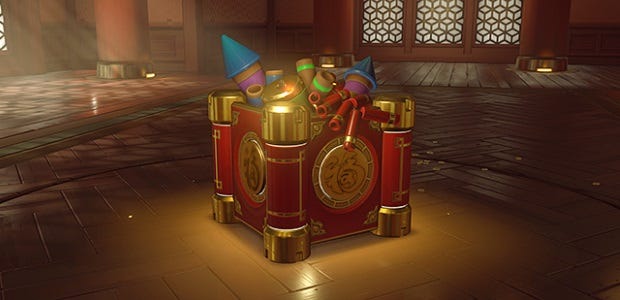Loot Crate debate escalates, Hawaiian lawmakers speak
What's in the box? Pain.
Last year's explosion of negative press regarding loot crates in games (especially regarding their impact on Star Wars: Battlefront 2) is still being heard around the world. Now, the issue has reached the ears of a growing number of lawmakers.
As covered by the Hawaii Tribune Herald, the latest force to get involved is the Hawaiian state government, members of which have proposed two new laws that could have massive repercussions on the industry if they were to become nationwide law.
The first proposed change, split between House Bill 2686 and Senate Bill 3024, would probably be the most damaging. It prohibits the sale of 'any game featuring a system wherein players can purchase a randomized reward using real money to anyone younger than 21 years old'. While I understand the intent (consumer protections are important), this seems overly broad, and could have catastrophic effects on a number of related industries.
Collectible card games are the first thing that spring to mind. In some ways they're the original loot crates [do Panini sticker albums counts - footie ed]. As a teenager, I admit to spending a little money every weekend or two on Magic: The Gathering booster packs, and generations since have grown up with the likes of the Pokemon CCG, Yu-Gi-Oh and now the likes of Hearthstone. Funnily enough, this would have no effect on Living Card Games such as Netrunner, which sell fixed expansion packs of cards with no random elements.
The second proposed law, encompassing House Bill 2727 and Senate Bill 3025, strikes me as far more reasonable. It would require video game publishers to 'prominently label games containing such randomized purchase systems, as well as disclose the probability rates of receiving each loot box reward'. This not only seems like a more likely bill to be passed, but increases transparency in a way that I would be happy to see.
This is also similar to a recent Chinese law passed that forces games with loot crate or mobile style 'Gacha' mechanics to post the full odds on each and every loot box, allowing players to weigh up their chances a little better. Granted, our fragile human brains are notoriously bad at calculating risk (hence the success of casinos), but at least those able to use the statistics effectively will see some advantage from it.
The nature of loot crates in games is hotly debated now, but I do feel their impact is often exaggerated. When playing Middle Earth: Shadow of War, I found myself wondering why people even worried about buying them. The packs available in-game felt entirely tacked on and unnecessary for progression in the same way that Dead Space 3's infamous premium weapon store offered a whole lot of nothing in exchange for cold, hard cash.
Still, Battlefront 2's crates often contain direct character upgrades that would take multiple expensive rolls to claim without careful, steady exploitation of the currency and crate payout systems for regular play. It's bad business, tied to bad game design, and it's understandable why some would see heaven and earth moved to prevent such a thing in games.

